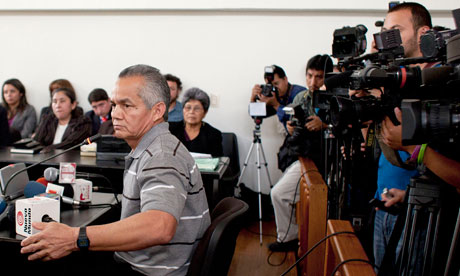By Brittney Hodnik
Impunity Watch Reporter, North America
GUATEMALA CITY, Guatemala – As previously reported, Guatemala began trying former dictator General Efrain Rios Montt for genocide and other crimes against humanity. Other high-ranking soldiers and officials are now facing the same fate. The 17-month period between 1982 and 1983 claimed the lives of nearly 250,000 people. Now, nearly 30 years later, the people responsible for these killings are being brought to justice.

According to The Associated Press, Pedro Pimentel Rios is the fifth former special forces soldier to be sentenced for his participation in the “Dos Erres” massacre in 1982. Rios was sentenced to 6,060 years in prison – 30 years for each of the 201 people slaughtered in the massacre, plus 30 years for crimes against humanity. All five of the former soldiers were sentenced to 6,060 years or more.
Rios is a 54 year old former instructor at a Guatemalan training school for elite military forces. He moved from Guatemala to Santa Ana, California where he worked in a sweater factory until finally being detained by immigration authorities in May 2010, according to The Associated Press. The United States extradited him to Guatemala the following year.
According to CNN, Judge Irma Valdez said Monday that the evidence presented by the prosecution along with testimonies from witnesses proved Pimentel was involved in the killings.
Maria Tulia Lopez Perez is just one of the many survivors of the three-decade long civil war. She still suffers back pain from the torture she endured in 1985, according to BBC News. She currently works with other survivors who come to her suffering from depression, insomnia, and post-traumatic stress; she helps them remember that they are not alone, reports BBC News.
The ruling is highly symbolic, according to The Guardian, because under Guatemalan law, criminals may only serve 50 years. This ruling comes as Guatemala seeks to clean up atrocities from the civil war.
As for Efrain Rios Montt, his defense lawyers say that he did not control battlefield operations while he was dictator, according to The Guardian. He faces charges of genocide and he is accused of ordering the killings of at least 1,700 innocent Mayan people during his reign.
Overall, more than 200,000 people were killed or “disappeared” during the 36-year civil war, where there were 669 documented massacres, as reported by CNN. Other officials will likely face the same consequences as Rios, receiving more than 6,000 years in prison, as Guatemala tries to bring some closure and justice to the victims of the civil war.
For more information, please visit:
Associated Press — Guatemalan gets 6,060-Year Sentence in Massacre — 13 Mar. 2012
BBC News — Healing Guatemala’s Emotional Scars from the Civil War — 13 Mar. 2012
CNN — 6,060 Years in Prison for Former Guatemalan Soldier — 13 Mar. 2012
The Guardian — Guatemalan Ex-Soldier Jailed for 6,060 Years Over Dos Erres Massacre — 13 Mar. 2012

